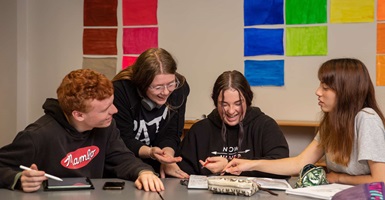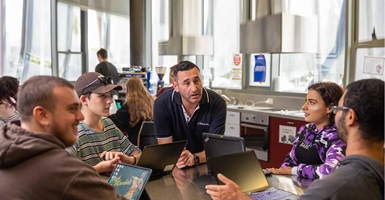If you’re thinking of becoming a mature-age student, returning to study could mean a big change to your income.
Worried about how you’ll pay the mortgage if you choose to study? You’re not alone. It’s a major concern for students, particularly mature-age students who typically have larger financial commitments.
The good news is it’s achievable. Students around Australia are making it work using a range of study solutions. Follow their lead with these tips.
Calculate the hours
Most students who have a full-time TAFE load still have enough time for part-time work. Making it even easier is the fact that many courses can be taken online or at least partially online, so students can spend less time commuting.
Don’t be put off by the words “full-time”, says Tania Pearce, Senior Advisor of Student Recruitment. “I think there’s an assumption that full time is a Monday to Friday, nine to five course, but it’s not,” she says. “You’re probably looking at an average of 25 hours a week, so it may be two full days and a part day.”
This means you can easily fit work into your remaining time. Taking a course part-time is also a wise choice for those who may need to continue working full-time or who need family-friendly hours.
“I think there’s an assumption that full time is a Monday to Friday nine to five course, but it’s not”
Ask about workplace flexibility
If you are upskilling within your industry rather than making a complete career change, you may find your employer is happy to offer support. Many workplaces recognise the importance of ongoing learning and may allow flexi-hours and working from home, or even grant absences of leave. Some may even share the costs of study.
Before deciding on whether to return to study, Tania recommends researching these possibilities. “It obviously depends on the job and the organisation, but there are companies that are quite flexible and allow people to have study leave,” she says. “The employee may have long service leave or a lot of accrued annual leave. So they need to do a lot of research and find out what options are available to them.”
Embrace the “learn now, earn later” philosophy
Building skill sets, expanding networks and getting up to date with technology are motivating factors for students returning to study. While dropping some working hours may put a dent in the finances, it’s only temporary.
“Studying now could mean a pay rise in the future,” Tania says. “Studying keeps you current and on trend. With a course that was delivered 20 years ago – even if you use an example like hairdressing – techniques and products change.
“It’s a bit of a sidestep now, but then you’ll launch ahead later on down the track”
“Technology evolves at a rapid rate, so it’s a good confidence boost to know all about it. And if you’re studying face to face, you’ll build up your networks. It’s a bit of a sidestep now, but then you’ll launch ahead later on down the track.”
Those considering study may also be unaware of just how quickly they could land a job in their chosen field. With Chisholm’s vocational values, students are armed with real skills and qualifications that will set them apart from the rest.
To support students’ employment opportunities, Chisholm offers a Skills and Job Centre to help with everything from resumé writing to interview advice.


